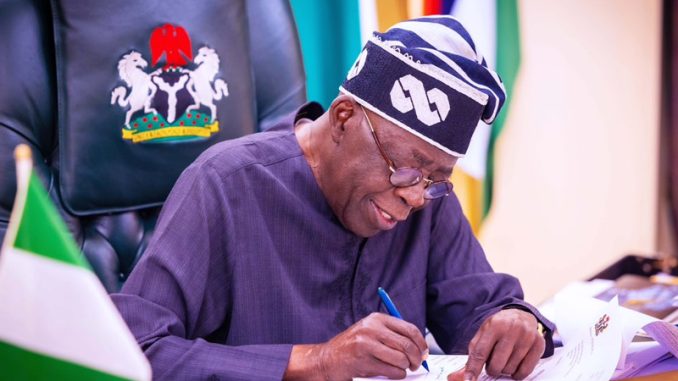
President Bola Tinubu, on Wednesday, increased the appropriation bill for the 2025 fiscal year from N49.7 trillion to N54.2 trillion.
Tinubu announced the increment in separate letters, which he forwarded to both the Senate and the House of Representatives on Wednesday.
Minister of Budget and National Planning, Senator Atiku Bagudu, explained that the increment was to allow for the approval of more revenue to strengthen the Bank of Agriculture and Bank of Industry.
Bagudu said the increase was also to support the administration’s diversification programme by putting more money in the solid minerals sector as well as infrastructure projects.
However, a member of the House of Representatives, Hon. Kingsley Chinda, faulted the procedure for the increment.
Chinda said the presentation from the executive should not have come in the form of a letter.
Tinubu’s letter was read during plenary in the Senate by Senate President GodswillAkpabio, and in the House of Representatives by Speaker Tajudeen Abbas.
Tinubu attributed the N4.53 trillion added to the appropriation bill to an increment in revenues recorded by some revenue-generating agencies of the federal government.
He said the increase arose from N1.4 trillion additional revenues made by the Federal Inland Revenue Service (FIRS); N1.2 trillion made by the Nigeria Customs Service; and N1.8 trillion generated by some other Government-owned Agencies (GOEs).
The Ministry of Solid Minerals Development was the highest beneficiary of the additional revenues, as it got N1 trillion.
The ministry, which has Mr. Dele Alake as minister, initially had N6 billion envelope from the Budget Office for the 2025 fiscal year before the National Assembly joint committee on Solid Minerals increased it to N9 billion.
The president of the senate after, reading the letter, consequently, directed the request to the Senate Committee on Appropriations for expeditious consideration.
Akpabio also declared that the budget consideration would be concluded and passed before the end of February.
Tinubu wrote in the letter, “I am writing to inform you of the availability of additional revenue amounting to N4,530,479,970,637 and to propose its allocation within the 2025 Appropriation Bill to enhance the budget’s responsiveness to the nation’s most pressing priorities and aspirations.
“This additional revenue, sourced from key agencies, represents a pivotal opportunity to address Nigeria’s critical challenges and advance its development agenda”
He said GOEs generated additional revenues of N1,823,879,970,637 while the FIRS raked in N1,497,600,000,000
Tinubu stated that the federal government’s 52 per cent share of the increase in revenue rose from N22.1 trillion to N25.1 trillion and put that of the NCS at N1,209,000,000,000
The federal government’s 52 percent share of the increase in revenue rose from N6.5 trillion to N9 trillion.
He said, “With this additional revenue, the 2025 appropriation bill’s total budget size will increase from N49.7 trillion to N54.2 trillion, demonstrating our commitment to inclusive growth and security.”
The president suggested the allocation of the proposed additional revenues to the Ministry of Solid Minerals Development, Bank of Agriculture, Bank of Industry, and other critical sectors.
Tinubu wrote, “I propose that these funds be allocated to the following transformative expenditure areas: Solid Minerals Sector, N1 trillion to support economic diversification by unlocking the potential of Nigeria’s vast solid mineral resources, which remain an untapped revenue stream and a vital pillar of non-oil growth.
“Recapitalisation of the Bank of Agriculture (BoA) – N1.5 trillion. This is to transform Nigeria’s agricultural landscape, ensure food security and empower smallholder farmers and agribusinesses.
“Recapitalisation of the Bank of Industry (Bol) – N500 billion. This is to provide critical support to small and medium enterprises (SMEs), drive local manufacturing, and reduce dependence on imports.
“Critical Infrastructure Projects (RHID Fund) – N1.5 trillion. N380 billion will be allocated as irrigation development through River Basin Development Authorities.
“Transportation Infrastructure (roads and rail) N700 billion; N300 billion for the construction and rehabilitation of critical roads and N400 billion for light rail network development in urban centres.”
The president also suggested the allocation of N50 billion to Border Communities Infrastructure, N250 billion for Military Barracks Accommodation, and N120 billion for Military Aviation.
Justifying the allocation of N1 trillion to the solid minerals ministry, Tinubu said it would boost economic resilience and reduce reliance on the volatile oil sector by creating alternative revenue streams.
In addition, he said the proposal would ensure regional equity by encouraging development in resource-rich, underserved areas, and boosting rural economies.
He said it would also support the processing and export of minerals and increase foreign exchange earnings.
Tinubu said the Bank of Agriculture recapitalisation would empower smallholder farmers and agribusinesses to improve their access to affordable credit. It is also expected to enhance agricultural productivity and support agro-industrial value chains, he said.
Additionally, he said the bank’s recapitalisation would lead to export competitiveness by promoting the export of high-value crops and reducing pressure on the naira.
Similarly, the N500 billion meant for the Bank of Industry recapitalisation, according to the president, would provide affordable financing for innovation and entrepreneurship. He also said it would drive industrial growth and support local manufacturing by reducing unemployment and expanding the tax base through industrial expansion.
He stated in the letter, “Military Aviation: N120 billion will modernise Nigeria’s aviation capabilities, ensuring the military remains responsive to emerging security challenges.
“A Philosophical Case for Military Expenditure:
“The foundation of a thriving nation lies in its ability to protect its citizens. No infrastructure, no innovation, and no progress can be enjoyed or sustained without security.
“The government has a constitutional obligation to secure lives and property, and military expenditure is not merely a fiscal decision – it is a moral imperative.
“By investing in our armed forces, we affirm our resolve to end terrorism, safeguard the dignity of our people, and create conditions for economic prosperity.
“This budget reflects not only our commitment to securing Nigeria today but to building a future where every citizen can live and thrive without fear.
“This allocation framework underscores the administration’s dedication to fostering inclusive growth, addressing security challenges, and building resilience into Nigeria’s economic fabric.”
He added, “These investments will promote stability by addressing critical infrastructure deficits, especially in underserved regions, and strengthening national security by investing in agriculture, solid minerals, and manufacturing and reducing over-reliance on oil revenues.
“Catalyse economic growth: By enhancing infrastructure, supporting SMEs, and unlocking Nigeria’s vast economic potential.
“I urge the National Assembly to adopt and integrate these proposals into the 2025 Appropriation Bill, reflecting our shared commitment to national development.
“Kindly let me know if additional information or clarification is required.”
Bagudu, who spoke to newsmen shortly after seeing off Tinubu en route to France at the presidential wing of Nnamdi Azikiwe Airport, Abuja, explained the reason behind the upward review.
He said, “You will recall Mr. President submitted N49 trillion budget to the National Assembly and legislative work commenced.
“The legislative work continued with interactions between the executive and the National Assembly. The National Assembly and the Economic Management Team continued to interrogate all figures.
“In that process, the Senate Committee on Appropriation, Senate Committee on National Planning, Senate Committee on Finance established that we can generate more revenue by tasking all the institutions to do more and the Federal Inland Revenue Service confirmed the ability to do more than was submitted.
“Equally, it was established that the government-owned enterprises can contribute more revenue, as well the customs service.
“So additional revenue amounting to over N4.5 trillion was established and this was taken to the president.”
Bagudu added that the adjustment of the Medium Term Expenditure Framework would follow.
He explained, “When the budget was submitted, MTEF was amended.
“The MTEF that was initially approved was for a budget of less than N49 trillion, so it goes together and so the consequential amendment to the MTEF will certainly follow.”
However, Chinda faulted the manner of increment of the 2025 appropriation bill.
Chinda said he was not against the budget increment, but was of the opinion that budget presentations from the executive should not come in the form of a letter.
But Deputy Speaker, Benjamin Kalu, maintained that he only read a letter from Tinubu, adding that the House, through Order 1, Rule 1, could regulate its proceeding.
Chinda said, “I just listened to the deputy speaker present a very wonderful and beautiful budget speech. But I know that that is not a function of a parliamentarian, Mister Speaker. My point of order is changing Section 80…”
But Kalu interjected, insisting that he only read a letter and not a budget speech from the president.
Kau stated, “Please, correct that, we did not lay the budget on behalf of the executive. The executive sent us a letter, and by our rules, we are supposed to read the letter of Mr. President.”
Chinda maintained that the budget being presented to the parliament ought not to come by way of a letter.
He maintained, “What I’m saying is that the budget being presented to parliament does not come by way of a letter. That is the essence of the objection. It comes under Section 83 of the Constitution, where the president will lay before parliament income and expenditure projection, which has been done earlier.
“And so what we got today as a letter, I don’t know where to classify it. The procedure might not be right. It is not just an addendum.
“My dear colleagues, recall that the 2024 budget is still running and has not been completed, and we are still crying for funds to fund the 2024 budget, and that is one of the reasons why we had to extend the lifespan.
“So, if we have additional funds, there are places to apply it, and it will still be to the credit of the country. And if we are in 2025, we project that we are going to get additional revenue, it is for us to look at the budget, apply it properly and send it back to the executive.”
Chinda further argued that whenever the executive presented a budget, by the time the legislature completes the consideration, a budget of N4 trillion could be increased to N5 trillion.
“But the process and procedure that we are adopting today is completely strange to me. It does not fall anywhere under either our constitution or the rules of the House,” Chinda maintained.
Nevertheless, Kalu stood his ground, saying the 2025 appropriation bill was still being considered by the National Assembly.
He stated, “Parliament functions through its committees. We cannot do the work of the appropriation committee during plenary. If there’s anything that has to do with the budget of the Federal Republic of Nigeria, and communication has been sent to us, it is our duty, especially with the power given to this chair by Order 2, Rule 2.”
Kalu then stated, “Minority Leader, can you read Order 1 Rule 2?
Kalu read, “The proceedings in the House of Representatives, particularly sub-rule two, in all cases, not provided for here and after or by Sectional or other orders, precedence or practices of the House by resolution regulate its procedure.”



